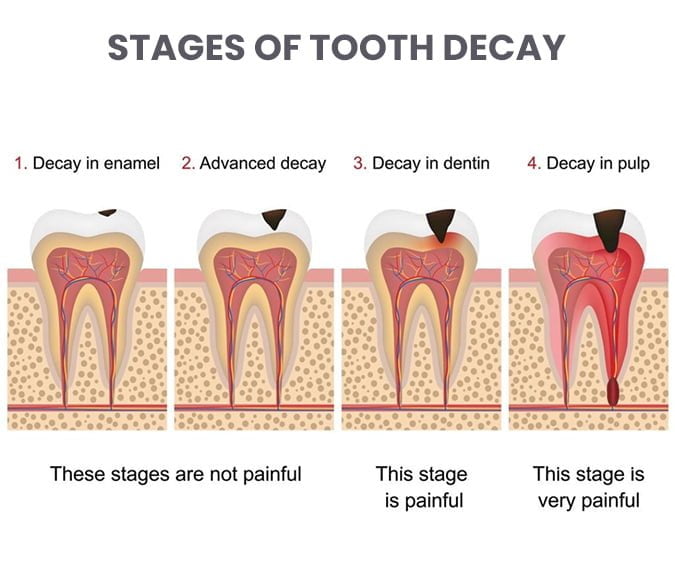
Tooth decay is difficult to avoid when so much of the American diet is filled with processed food that almost always has added sugars. But regular check-ups and bi-annual teeth cleanings can keep it at bay and prevent tooth damage. The only way to cure tooth decay is to stop it from worsening with expert care. Visit a boutique family dental practice in Downtown NYC operated by Dr. Alex Shalman. His tooth decay treatment not only stops further damage, but also assures that you look as good as you feel. Call for an appointment today.
Tooth decay is a dental condition that destroys the hard outer enamel layer of a tooth. Tooth decay usually develops over time, as acid from leftover food particles eats into the top enamel layer. If not treated early, it causes long-term dental health complications. Tooth decay typically follows a pattern that includes:
Fantastic experience every time I come to the office! Lovely staff, never have to wait, & Dr.Shalman is very thorough and simply the best.
Mariesa StreettRegular check-ups and dental cleanings at Dr. Alex Shalman’s boutique dental practice prevent the gradual damage of tooth decay. At his Downtown Manhattan dental office, you get exceptional dental care at a state-of-the-art facility equipped with the latest technology. And Dr. Shalman caters not only to your oral health, but also to your appearance through exceptional cosmetic dentistry services.

A combination of factors contributes to tooth decay. The main causes of this common dental problem include:
There is no cure for tooth decay once it’s started. You can only stop it in its development with professional tooth decay treatment and take steps to prevent further decay.
Unlike other dental issues, tooth decay isn’t always easy to identify when it first starts. If you don’t visit your NYC dentist every six months, you may not even realize it’s begun until it’s too late and you need emergency pain relief. Signs that you may be developing tooth decay include:
Dr. Shalman assesses the extent of damage to determine the most effective treatment for your tooth cavity. The latest diagnostic technology helps map the actual damage, which boosts the efficacy of whatever dental procedure your dentist selects.
Your dentist recommends tooth decay treatment depending on the severity of the problem. Treatments may include:
No two cases of tooth decay are similar. Your dentist considers the extent of damage, tooth location and your age to determine how to cure tooth decay.
Tooth decay can affect your life due to the excruciating pain at advanced stages. Regular visits to your dentist are the best preventive steps you can take to get an early diagnosis and prevent further damage from extending to your gums and jaw bone. Other simple steps to prevent tooth decay include:
In Lower Manhattan, contact Dr. Alex Shalman, an experienced family dentist in Lower Manhattan, who combines aesthetic dental procedures with family dentistry to deliver exceptional dental care. At his boutique practice, you enjoy outstanding customer service, personalized attention and the latest treatment technologies in dental care.
Shalman Dentistry
44 W 10th St #1A
New York, NY 10011
(10th St, between 5th & 6th Avenue)
☎ (212) 658-1093
Get Directions (Map)